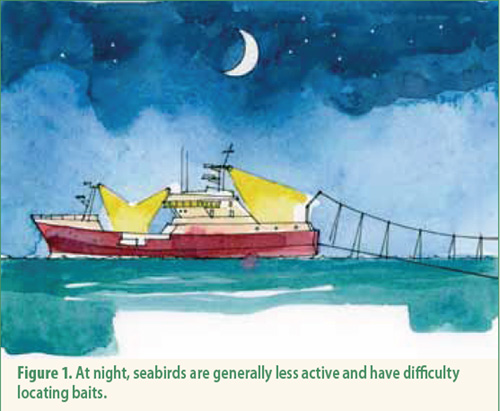The Inter-American Tropical Tuna Commission held the Third Meeting of its Scientific Advisory Committee over 15-18 May 2012 in La Jolla, California, USA. Dr Marco Favero, Chair of ACAP's Advisory Committee, attended the meeting on behalf of the Agreement where he presented, along with BirdLife International, a paper that offered advice on reducing the impacts of pelagic longline gear on seabirds.
The advice summated a comprehensive analysis of new research and evidence on seabird bycatch mitigation in pelagic longline fisheries that was conducted in 2011 during the Sixth Meeting of the ACAP Advisory Committee and the Fourth Meeting of its Seabird Bycatch Working Group. The document indicates that a combination of weighted branch lines, bird-scaring lines and night setting represents best-practice mitigation for pelagic longline fisheries. It states that these measures should be applied in high-risk areas such as the high latitudes of southern hemisphere oceans and in lower to mid-latitude fisheries of both the northern and south-east Pacific Ocean to reduce the incidental mortality to the lowest possible levels. The report emphasizes that currently no single mitigation measure can reliably prevent the incidental mortality of seabirds in pelagic longline fisheries. The most effective approach is therefore to use the above three proven measures in combination.
The Inter-American Tropical Tuna Commission is holding its 83rd Meeting this week in La Jolla with Marco Favero once more representing ACAP. Marco will continue to encourage progress towards refining Resolution C-11-02 to mitigate the impact on seabirds of fishing for species covered by the IATTC to take account of ACAP's advice on best practice.

As soon as information of the IATTC's 2012 deliberations becomes available it will be reported on here.
Reference:
Agreement on the Conservation of Albatrosses and Petrels (ACAP) & BirdLife International 2012. ACAP - BirdLife International advice to the IATTC Scientific Advisory Committee: reducing the impact of pelagic longline gear on seabirds. 16 pp.
With thanks to Marco Favero, Chair ACAP Advisory Committee for information.
John Cooper, ACAP Information Officer, 26 June 2012

 English
English  Français
Français  Español
Español